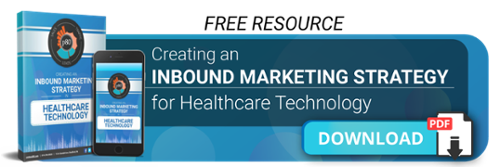Inbound Marketing Blog
for Manufacturers and Healthcare Companies
Why Blogging Matters to B2B Marketing in the Healthcare Industry

Marketing in the healthcare industry can be a slippery slope. For B2B health care? Even more so.
For readers to trust you, you’ve got to provide accurate, up-to-date information. Then there’s the matter of keeping a customer happy with demos, trials, updates, and ongoing tech support.
One pro to B2B healthcare marketing is typically your readers will have background knowledge in the terminology and topics being discussed. Losing your readers with dense content can be a huge obstacle for B2C healthcare marketing.
All that to say … can blogging provide adequate ROI for B2B marketing in the healthcare industry? Is your target audience interested in reading such content?
Although learning how to develop adequate healthcare marketing strategies can be challenging at first, the doc says your blogging results will be rewarding.
4 Reasons Why Blogging Matters to B2B Healthcare Marketing
Here are four reasons why blogging matters to B2B healthcare:
- Increased Website Traffic
- Provides a sample of what you have to offer.
- Gather Information for Targeted Marketing
- Monitor Industry Trends & Competitors
1. Increased Website Traffic
Blogging helps increase the chances of your website being noticed -- even in a niche industry.
For your website to appear in a Google search, you must include searchable keywords. What is a searchable keyword? It’s a word or phrase that your readers are likely to type into the search bar. By including these words, your blog posts are more likely to appear in a Google search, thus increasing website traffic.
Knowing when to use the proper keywords is extremely important. There are two types of keywords: long-tail keywords and head keywords.
Long-tail keywords are keywords with three or more words. They typically receive less traffic, but are higher quality. Long-tailed keywords will yield shorter term, higher quality success. Head keywords are phrases under three words. These types of keywords typically yield more traffic, but are lower quality. Head keywords would better serve as a long-term goal.
Keywords aside, remember this simple fact: The more pages exist on your website, the more pages and keywords you can rank for in Google.
2. Provides a sample of what you have to offer.
Maintaining accuracy is imperative. Accurate and reliable information will lead to trustworthiness. When establishing yourself as a business, specifically for the healthcare industry, proving your knowledge and trustworthiness is crucial. To convert readers into customers (who eventually renew their services with you), building relationships is of the utmost importance.
Blogging can help to deliver a sample of what you have to offer. The B2B sales process can be extensive. By providing a sample of your knowledge and services to customers, it can help to expedite the decision-making process.
For example, when you’re in the market for a new car, would you buy a car without test driving it first? The same goes for healthcare technology. Your product or service likely represents a massive investment for the reader (and whoever the reader answers to) -- blogging can help readers make informed decisions that directly impact their business.
3. Gather Information for Targeted Marketing
Having trouble finding ways to gather consumer information for targeted marketing? Blogging can help solve this problem.
One of the most popular ways to increase conversion rates is by including a call-to-action (CTA) at the end of a blog post. Creating a CTA that requires readers to input basic information, such as name, email, and occupation/reason for site visit, can help you better understand your buyer persona.
Using this information, companies would be able to create targeted marketing campaigns. This can be especially useful in the B2B healthcare industry. If the president of a healthcare organization were to visit your site and, say, download an e-book or sign up for a newsletter, you would be able to send targeted emails and other marketing materials to them directly.
4. Monitor Industry Trends & Competitors
Almost by default, creating a blogging strategy also acts as a window into your customers’ and competitors’ minds.
Like any business, B2B healthcare marketers face changing industry trends, as well as a growing number of competitors. Part of your blog topic brainstorming should include content/keyword research on your competitors. What topics are they covering that you could cover better? What keywords do they rank for that you should target too?
This alone isn’t enough to stand out and develop an effective healthcare marketing strategy. Staying up to date on the latest industry trends will help further distinguish you from competitors. These trends will provide you with solid blogging topics your customers are already searching for.
Ready, Set, Start Blogging!
As the way business is conducted continues to change, it’s no longer enough to simply rely on the strength of your product and ol’-fashioned word-of-mouth. You must develop a strong healthcare marketing strategy that will distinguish you from your stuck-in-the-past competitors.
Learn more about developing modern digital marketing strategies here:
Our Blogs, Direct to Your Inbox!
How to Audit your Online Marketing
If you are executing digital marketing, congratulations! You are most likely already one step ahead of your competition, and making strides to meaningfully connect with prospects online. But, how do you know if you’re seeing continual success year over year, and improving your metrics?
Without the tools in place to analyze and benchmark your efforts, it is impossible to scale your online marketing and ensure continuous success.


